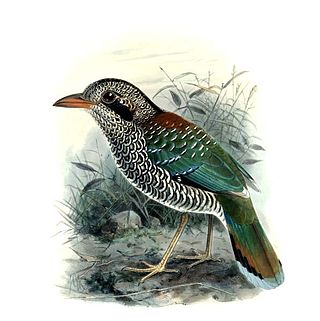
The Coraciiformes are a group of usually colourful birds including the kingfishers, the bee-eaters, the rollers, the motmots, and the todies. They generally have syndactyly, with three forward-pointing toes, though in many kingfishers one of these is missing. The members of this order are linked by their “slamming” behaviour, thrashing their prey onto surfaces to disarm or incapacitate them.

Coraciidae is a family of Old World birds, which are known as rollers because of the aerial acrobatics some of these birds perform during courtship or territorial flights. Rollers resemble crows in size and build, and share the colourful appearance of kingfishers and bee-eaters, blues and pinkish or cinnamon browns predominating. The two inner front toes are connected, but not the outer one.

The ground rollers are a small family of non-migratory near-passerine birds restricted to Madagascar. They are related to the kingfishers, bee-eaters and rollers. They most resemble the latter group, and are sometimes considered a sub-family of the true rollers.

The cuckoo-roller or courol is the only bird in the family Leptosomidae, which was previously often placed in the order Coraciiformes but is now placed in its own order Leptosomiformes. The cuckoo-roller is at the root of a group that contains the Trogoniformes, Bucerotiformes, Piciformes, and Coraciiformes. Despite its name, the Cuckoo-roller does not share close evolutionary origins with cuckoos or rollers at all.

The Madagascar lowland forests or Madagascar humid forests are a tropical moist broadleaf forest ecoregion found on the eastern coast of the island of Madagascar, home to a plant and animal mix that is 80 to 90% endemic, with the forests of the eastern plain being a particularly important location of this endemism. They are included in the Global 200 list of outstanding ecoregions.

The Madagascar subhumid forests are a tropical moist broadleaf forest ecoregion that covers most of the Central Highlands of the island of Madagascar. They are included in the WWF's Global 200 list of outstanding ecoregions. Most of the original habitats have been lost due to human pressure.

The Malagasy kingfisher or Madagascar kingfisher is a species of bird in the family Alcedinidae that is found in Madagascar, Mayotte and the Comoros. Its natural habitat is subtropical or tropical mangrove forests.

The pitta-like ground roller is a species of bird in the ground roller family Brachypteraciidae. The species is monotypic, having no subspecies. It is endemic to Madagascar.

Atelornis is a small genus of birds in the ground-roller family Brachypteraciidae. The genus is endemic to Madagascar.

The short-legged ground roller is a species of bird in the ground roller family Brachypteraciidae. It is the only living species in the genus Brachypteracias and is endemic to Madagascar. It is threatened by habitat loss.

Brachypteracias is a small genus of birds in the ground-roller family Brachypteraciidae. The genus is endemic to Madagascar.

The scaly ground roller is a species of bird in a monotypic genus in the near-passerine family Brachypteraciidae. It is endemic to eastern Madagascar. Its natural habitat is subtropical or tropical moist lowland forest. The scaly ground roller is found at elevations below 1,000 meters (3,300 ft), and one of the few birds of Madagascar to reside in lowland rainforest.

The long-tailed ground roller is a species of bird in the ground roller family Brachypteraciidae, placed in the monotypic genus Uratelornis. Endemic to arid spiny forests near the coast in southwestern Madagascar, this ground roller occurs at extremely low population densities throughout its habitat. This species requires shade and a deep layer of leaves on the ground, and it is absent from parts of the spiny forest lacking these features. It has no recognized subspecies, and its closest relative is the scaly ground roller. The long-tailed ground roller is the only ground roller to definitively display sexual dimorphism. It is a medium-sized bird with a plump silhouette and a long tail. The upperparts are dark brown with black streaks while the underparts are light gray. The white throat is framed by black malar stripes and a black breastband, and a white stripe is present at the base of the bill. Sky-blue feathers are visible at the edge of the wings and the tail. Calls are rarely made outside the breeding season, though multiple courtship calls are made.

The rufous-headed ground roller is a species of bird in the ground roller family, Brachypteraciidae. It is endemic to Madagascar. There are currently five known species of ground rollers. Four of these species live in the eastern and central highland humid forests. Unlike the four other species, the fifth species lives in the dry southwestern spiny bushes of Madagascar. The Atelornis crossleyi species of the ground rollers lives with most of its family in humid forests. The International Union for Conservation of Nature considers the bird to be near-threatened because, although it is present in a number of protected areas, it is hunted for food and the forests in which it lives are threatened by slash-and-burn cultivation. The bird's scientific name commemorates Alfred Crossley who collected mammals, birds, butterflies and moths in Madagascar and Cameroon in the 1860s and 1870s. Many of these are in the Natural History Museum, London.

Zahamena National Park is a national park of Madagascar. Established in 1997, it covers an area of 423 square kilometres (163.32 sq mi) out of a total protected area of 643 square kilometres (248.26 sq mi). It is part of a UNESCO World Heritage Site, Rainforests of the Atsinanana, inscribed in 2007 and consisting of 13 specific areas located within eight national parks in the eastern part of Madagascar. In 2001, Bird Life International assessed avifauna of 112 species of which 67 species are exclusively endemic to Madagascar.

The broad-billed roller is a member of the roller family of birds which breeds across tropical Africa and Madagascar in all but the driest regions. It is a wet season breeder, which migrates from the northern and southern areas of its range towards the moister equatorial belt in the dry season.












